| |
|
| |
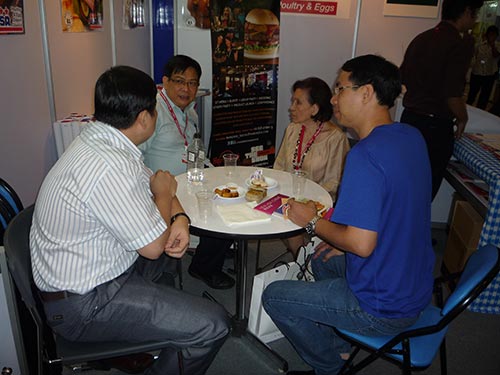 |
|
Welcome
Welcome to the first issue of USAPEEC ASEAN Regional Office.
This newsletter intends to provide our readers with useful product and market information for institutional and consumer users of U.S. poultry. Readers will find in every issue a variety of general market information, program activities, as well as useful product information.
Contents:
- USAPPEC office participates in Food Asia
- Need to adhere to different regulations
- Vietnam’s big appetite for imported poultry
- Thriving trade in frontier markets
- No change in halal rules in Indonesia
|
|
Margaret Say talks to trade members |
| |
|
|
|
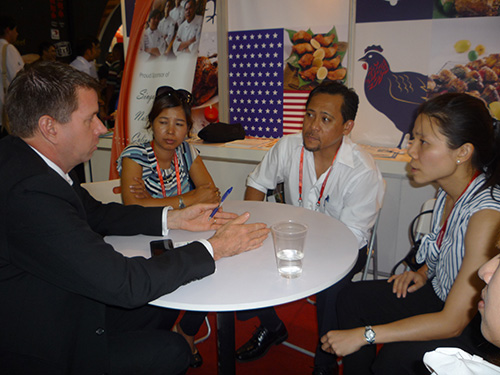 |
|
USAPEEC Office is the one stop office for trade contacts
Visiting USAPEEC members who are interested in exporting to the individual ASEAN markets are encouraged to call on the USAPEEC Singapore office for market updates.
Contact:
Margaret Say, Regional Director
Tel: (65) 67371726
Email: msay@usapeec.org.sg
usapeec_sing@pacific.net.sg |
|
Tom Taylor, Manager, Asian Promotions, USAPPEC in discussion with Rey Santella, U.S. Ag Attache, Bangkok and Ag Specialists, Bangkok and Yangon. |
| |
|
|
|
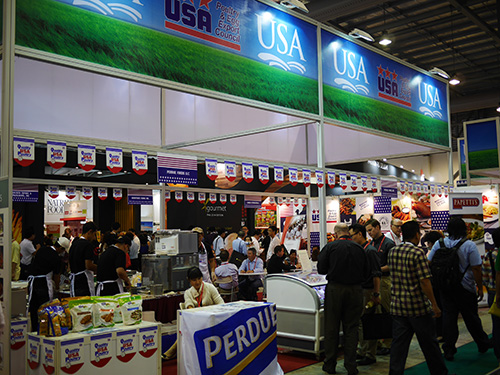 |
|
USAPEEC Singapore participates in Food & Hotel Asia 2014 Show
The Food & Hotel Asia (FHA) 2014 Show which took place during April 8-11 2014 at the Singapore Expo, Singapore is the largest regional food trade show in Asia. More than 3,000 international and local exhibitors from 70 countries participated in this premier food trade event. FHA served as an international platform to showcase a wide range of food and beverage products from all over the world. It enabled international exhibitors to develop trade contacts and possible business with thousands of traders coming in from various countries in the Asia Pacific region. Initial registration records reveal that more than 45,000 food trade visitors have visited the show during the four day event.
The USAPEEC regional office in Singapore participated in the event with a number of leading U.S. poultry exporters taking up space in the USAPEEC exhibit area. During the four day show period, USAPEEC staff met with both existing established trade contacts as well as with scores of new regional trade contacts. The USAPEEC office contracted with Hard Rock Café chefs to prepare different poultry dishes for taste testing each day. Extremely favorable reviews were received from the trade visitors who had the opportunity to sample the various poultry dishes prepared in local and international recipes.
The last evening of the show culminated in the holding of the FHA Culinary Challenge 2014 awards presentation. During the ceremony, awards were presented to leading teams of chefs who have participated. More than 400 chefs and invited guests attended the event. Tokens of appreciation were handed out to event sponsors including the Singapore USAPEEC office which co-sponsored the event with Nestlé Singapore. |
|
USAPEEC Pavilion at Food & Hotel Asia 2014 Show |
| |
|
|
|
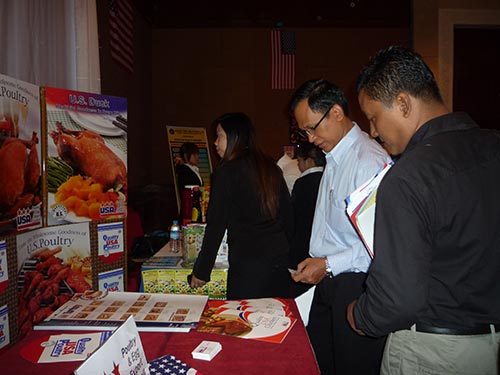 |
|
Exporters need to ensure compliance with various import regulations of different markets
The ASEAN grouping of 10 nations with a total population of 600 million has in the last decade made significant strides in lowering tariff barriers within the grouping. The ASEAN Preferential Trading Arrangement (PTA) offer very low tariff rates of between 0-5 percent for over 90 percent of the tariff line items traded between the ASEAN member countries. The grouping is also preparing for the inauguration of ASEAN Economic Community scheduled for 2015.
However, in the agricultural and food sectors, significant market access barriers remain. Within the ASEAN grouping, and with exception of oil rich Brunei and highly urbanized and industrialized Singapore, agricultural production and processing of farm products provide significant employment and economic activity for the other remaining 8 member nations. It is not surprising to find various protective measures enacted to protect the local farming communities in almost every one of the ASEAN member countries.
Barriers to import trade may be found in various forms. One of the most common barriers enacted lies in the need to get an import permit for all food products. The import permit for most agricultural products are sometimes denied simply because of the need to provide protection to local farmers
Other non-tariff barriers include the requirement for individual poultry and beef plants being pre-approved and accredited to export halal products for countries which have Muslim majority populations. Exporters are encouraged to check the FSIS export register for the individual market of interest to ensure that import rules of the destination market are complied with.
Despite the various market access barriers, ASEAN collectively imported a total of 193,000 metric tons of U.S. poultry meat valued at US$222 million for the entire calendar year of 2013. The largest destination markets for U.S. poultry exports in descending order are Philippines 80, 377 metric tons, Vietnam 54,988 metric tons and Singapore 30,339 metric tons.
Exporters who are patient and who are able to navigate through the onerous import requirements will find themselves well rewarded since less open markets often keep other competitors out.
|
|
USAPEEC at the Myanmar Showcase 2013 |
| |
|
|
|
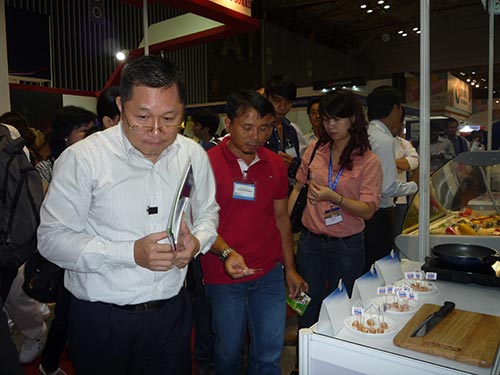 |
|
Vietnam, a big appetite for imported poultry
Vietnam which has a rapidly growing youthful population estimated at 90 million in 2012, a fast expanding middle income group as well as robust economic growth rates over the last decade provides extraordinary market opportunities for a wide range of imported consumer orient agricultural products. Grocery retail sales have increased 130 percent between the period 2008 to 2012 to reach US$43 billion.
While the Vietnamese consumers are still mostly serviced by traditional small grocery shops which comprised over 95 percent of grocery retail sales in the country, the rapid rise in the number of modern grocery stores particularly in the larger urban areas has helped to provide infrastructure and cold chain facilities to distribute frozen and chilled western type products from the United States, Australia, New Zealand, EU, Brazil and Japan.
The modern supermarkets, hypermarts and convenience stores are preferred point of distributions for a wide range imported chilled and frozen products. Chillers and freezers in the modern supermarkets offer a wide variety of dairy products from Australia , New Zealand and EU, fresh temperate climatic fruit from E, China and the United States.
Due to limited local production, Vietnam imports considerable volumes of beef from India and the United States. Over recent years, the country has been importing significant tonnages of frozen poultry. Unfortunately Vietnam does not publish official annual import statistics and trade figures have to be obtained from third country sources to piece together a more complete picture of the poultry import trade.
While official trade export figures from the United States show that in 2013, Vietnam imported about 54,988 metric tons of frozen poultry, third country trade sources reveal that Vietnam’s frozen poultry imports from Hong Kong were far more; a staggering 397,000 metric tons valued at US$452million in CY2013. In fact this latest figure was a far cry from the imports of 632,000 metric tons valued at US$US$678 million from the same country supplier in 2011.
|
|
Food and Hotel Vietnam 2013 |
| |
|
|
|
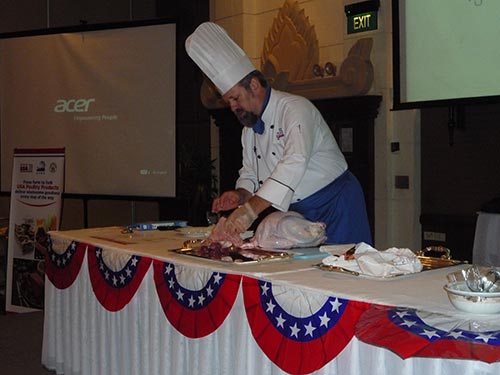 |
|
Thriving poultry import trade in frontier markets
Timor Leste (population 1.2 million in 2012 ) and Laos(population 6.6 million in 2012 ) may have small impoverished economies with GDP estimated at US$1,293million and US$9,299 million respectively but imports considerable volumes of frozen poultry in 2013. According to Singapore official export figures, Singapore exported 3904 metric tons of frozen poultry valued at US$25.1 million to Timor Leste. Thai official trade statistics show that Thailand exported 51545 metric tons of frozen poultry valued at US$97.1 million to Laos in 2013.
The main constraints to exports of frozen poultry is the absence of an agreed and well defined import protocol, totally inadequate cold chain infrastructure and distribution network throughout the country at all retail outlets. Consumers are not able to store frozen poultry for more than a day at their residences. |
|
Poultry demonstration at the 2013 Cambodia Showcase |
| |
|
|
|
 |
|
Indonesia - Current halal requirements remain
Indonesia is pre-dominantly a Muslim country; and consequently requires that imported meat(except pork products) and poultry products as well as food products containing meat and poultry ingredients must be halal to cater to the local consumers. Currently only whole turkeys and ducks are eligible for import into Indonesia.
The Ministry of Agriculture controls poultry imports through the issuance of import permits and currently will not issue any for chicken part imports. Imports of poultry and poultry product must be accompanied by a halal certificate. This certificate of Islamic Slaughter must be issued by a U.S. Islamic Center recognized by the Indonesian Council of Ulama in respect of the imports of all poultry, beef and mutton.. The combined religious and non-religious barriers to poultry imports have been a huge market access barrier for imported poultry in general.
U.S. poultry establishments intending to export poultry meat to Indonesia must be inspected and approved by the Indonesian authorities prior to export. In addition, these poultry products must be certified halal by any of the below listed U.S. Islamic Centers which have been approved by the Indonesian authorities. The Indonesian Council of Ulama (MUI) had in January 2011 recognized the following Islamic Centers as being able to provide a certificate stating that the poultry was slaughtered according to Islamic religious requirements for (poultry slaughtered to include chicken, duck and turkey):
The following is the list of currently approved U.S. Islamic Centers:
- Halal Food Council of USA , Salisbury, MD
- Halal Transaction of Omaha, NE
- Islamic Services of America, (ISA) Cedar Rapids, IA
- Islamic Information Center of America (IICA)
- The Islamic Food and Nutrition Council of America (IFANCA)
The above current list is valid until a new list is published.
|
|
USAPEEC booth at Food and Hotel Indonesia 2013 |
|
You have received this email because you have registered to get newsletters from USAPEEC ASEAN.
If you prefer not to receive these updates, please
click here
to unsubscribe.
Do not reply to this email. For enquiries, go to www.usapeecasean.com
® USA POULTRY & EGG EXPORT COUNCIL
541 Orchard Road, #15-04, Liat Towers, Singapore 238881 Tel: (65) 67371726 Fax: (65) 67371727 |
|
|
|